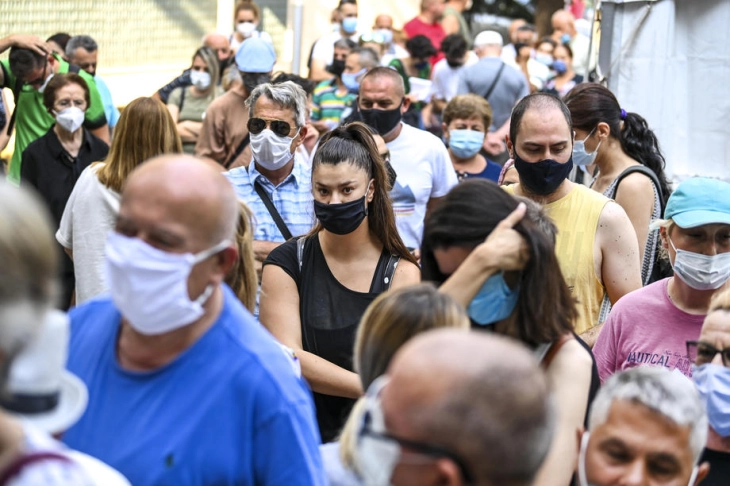Balkan countries tighten restrictions as Covid-19 cases surge
- Post By Magdalena Reed
- 18:13, 20 August, 2021

Sofia, 20 August 2021 (BTA/MIA) — New Covid-19 infections are increasing in most of the Balkan countries and the authorities are setting back in place some restrictions. An increasing number of countries require a certificate of vaccination or recovery from infection for access to public spaces.
Following are the key COVID-related developments in the outgoing week:
Turkey has recently been reporting close to 20,000 new cases a day. About a million vaccines are given daily and yet the number of fatalities is rising. Close to 87 million vaccines have been given, with 34 million people now having received two doses and over 7 million, three doses. All children aged 15 and those aged 12 and over with chronic conditions have a right to a Covid jab. Medical workers and other priority groups are entitled to a fourth vaccine dose.
Turkey joined the EU vaccination certification system, along with Ukraine and the Republic of North Macedonia. Schools start on Sept. 6 with in-person classes and teachers who are not vaccinated will be required to do PCR tests twice weekly. The same will be required of unvaccinated students and university faculty. One will need a negative PCR test to go to a concert, theater or the cinema, as well as for air travel and for long-distance buses. The mandatory tests will be free of charge.
Greece is a red zone on the Covid infections map of the European Center for Disease Prevention and Control. Crete, the Ionian islands, the Dodecanese and the Cyclades are in deep red. Last week the authorities broadened the restrictions in Crete: a curfew from 1 am to 6 am is to stay in effect at least until Aug. 25. A ban on public events with over 20 people is in place across the country.
Cyprus logged just over 110,000 new infections and 467 deaths on Aug. 18. The test positivity rate was 0.97 percent and the situation in the past days has been stable, with some 400 new cases reported daily.
Infections in Romania started going up in recent days, crossing the 500 mark for the first time since May 20 on Aug. 18. ICU admissions are also on the rise. The country, however, remains in the green zone with less than 1.5 cases per 1,000 population. Between 10,000 and 14,000 people are vaccinated daily and the vaccinated totaled 5,161,459 on Aug. 19, including 5,033,534 fully vaccinated.
The Republic of North Macedonia has started requiring vaccination certificates for entry in shopping centers. A certificate of at least one vaccine dose or of recovery is required for going to a restaurant, a conference, weddings and other private celebrations. The new measures prompted protests in Skopje and Strumica. Tourist agencies warned that a PCR test mandate would bring the tourist sector to collapse.
Slovenia is in the amber zone and announced tightening the measures for its citizens and foreigners transiting the country. The average number of new infections was 237 in the past seven days. From Aug. 16, wearing a mask is mandatory for cultural events. All arrivals by air, land or water are required to fill out a PLF form.
From Aug. 23, all transit passengers will have to show a certificate for vaccination or past infection, or a negative Covid test. So far this was required only of people staying longer than 12 hours in Slovenia. Unvaccinated staff in restaurants, hotels, social care establishments, health care and taxi drivers will be required to take a rapid test every 48 hours or a PCR test every 72 hours. Now they have to do it once a week.
Serbia started administering a booster dose of the Covid vaccines on Aug. 17. The vaccination program started rolling out last December with Pfizer, AstraZeneca, Russian and Chinese vaccines. With only 40 percent of the population fully vaccinated, the number of new infections has been going up. Despite the wide availability of vaccines, vaccine reluctance is wide-spread and Serbia continues to donate vaccines. Foreign Minister Nikola Selakovic went on an African tour including Kenya, Zambia, Angola and Namibia, and took with him vaccines to donate.
Kosovo set in place new restrictions after the new case count topped 2,000 in a single day. All night clubs shut down as of Aug. 20 and weddings will be banned. Restaurants and cafes will close at 10:30 pm. As of last week vaccination is mandatory for all who want to attend indoor events. In the outgoing week Kosovo also approved Covid vaccination for children aged 12 to 15.
Croatia reported 486 new cases after 9,962 tests on Aug. 19, which makes a test positivity rate of 4.87 percent. Experts expect a further surge in infections after the tourist season as Croatia was visited by more than 1 million tourists from countries with an epidemic of the delta variant. They, however, don't think the looming fourth wave of infections will be as intense or as long as the third wave.
Health authorities in Albania said the majority of confirmed delta cases were among unvaccinated people. Only 2-3 percent of the population have two vaccine doses and 10 percent have one dose. The health minister urged the government to consider mandatory vaccination and called on people and the authorities to observe the restrictions.
Bosnia and Hercegovina has been reporting three-digit number of new cases since early August, after a quiet one-and-a-half months. Health experts have warned that the country is entering a fourth wave and new cases will keep rising. Bosnia is lagging behind with vaccinations. Some 536,000 people or 15.7 percent have had a first dose and 327,000 people or less than 10 percent have had a second dose.
Montenegro requires a vaccination certificate or a negative Covid test for entry in restaurants and clubs, and of hotel staff. Tourists with severe Covid symptoms are sent to hospital at the state's expense.







